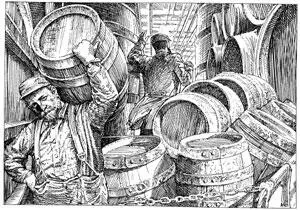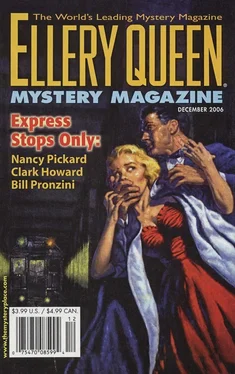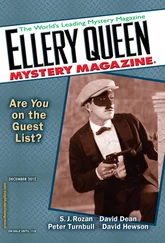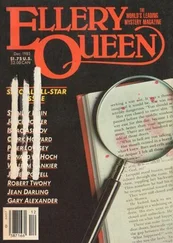Нэнси Пикард - Ellery Queen’s Mystery Magazine. Vol. 128, No. 6. Whole No. 784, December 2006
Здесь есть возможность читать онлайн «Нэнси Пикард - Ellery Queen’s Mystery Magazine. Vol. 128, No. 6. Whole No. 784, December 2006» весь текст электронной книги совершенно бесплатно (целиком полную версию без сокращений). В некоторых случаях можно слушать аудио, скачать через торрент в формате fb2 и присутствует краткое содержание. Город: New York, Год выпуска: 2006, ISBN: 2006, Издательство: Dell Magazines, Жанр: Детектив, на английском языке. Описание произведения, (предисловие) а так же отзывы посетителей доступны на портале библиотеки ЛибКат.
- Название:Ellery Queen’s Mystery Magazine. Vol. 128, No. 6. Whole No. 784, December 2006
- Автор:
- Издательство:Dell Magazines
- Жанр:
- Год:2006
- Город:New York
- ISBN:0013-6328
- Рейтинг книги:3 / 5. Голосов: 1
-
Избранное:Добавить в избранное
- Отзывы:
-
Ваша оценка:
- 60
- 1
- 2
- 3
- 4
- 5
Ellery Queen’s Mystery Magazine. Vol. 128, No. 6. Whole No. 784, December 2006: краткое содержание, описание и аннотация
Предлагаем к чтению аннотацию, описание, краткое содержание или предисловие (зависит от того, что написал сам автор книги «Ellery Queen’s Mystery Magazine. Vol. 128, No. 6. Whole No. 784, December 2006»). Если вы не нашли необходимую информацию о книге — напишите в комментариях, мы постараемся отыскать её.
Ellery Queen’s Mystery Magazine. Vol. 128, No. 6. Whole No. 784, December 2006 — читать онлайн бесплатно полную книгу (весь текст) целиком
Ниже представлен текст книги, разбитый по страницам. Система сохранения места последней прочитанной страницы, позволяет с удобством читать онлайн бесплатно книгу «Ellery Queen’s Mystery Magazine. Vol. 128, No. 6. Whole No. 784, December 2006», без необходимости каждый раз заново искать на чём Вы остановились. Поставьте закладку, и сможете в любой момент перейти на страницу, на которой закончили чтение.
Интервал:
Закладка:
Copyright © 2006 by Paul Lascaux, Stefan Slupetzky, Anke Gebert, Richard Lifka, Thomas Przybilka, & Christoph Spielberg.
Translation © 2006 by Mary Tannert.
Devil’s Brew
by Bill Pronzini

Bill Pronzini’s stellar reputation in the mystery field is based mainly on his fiction writing, but his name is also seen frequently as the editor of mystery anthologies. His most recent editorial project is a book of Erle Stanley Gardner stories entitled The Casebook of Sidney Zoom (Crippen & Landru/July ’06). He also had a new novel out this past summer. See The Crimes of Jordan Wise (Walker/June ’06).
There were few more undesirable places for a detective and temperance man to be plying his trade, Quincannon reflected sourly, not for the first time in the past week, than the bowels of a blasted brewery.
The fine, rich perfume of malt, hops, yeast, and brewing and fermenting beer permeated every nook and cranny of the two-story, block-square brick building that housed Golden Gate Steam Beer. Whenever he prowled its multitude of rooms and passages, he was enveloped in a pungent miasma that tightened and dried his throat, created a thirst that plain water couldn’t quite slake. In his drinking days he had been mightily fond of the type of lager, invented during the Gold Rush and unique to San Francisco, known as “steam beer.” John Wieland’s Philadelphia Brewery, the National Brewery, and others operating in the city in this year of 1896 specialized in porter and pilsner; if one of their owners had sought his services, he would not be suffering such pangs as this place instilled in him. But it had been Golden Gate’s James Carreaux who had come calling, and the fee-plus-bonus he’d offered for an investigation into the bizarre death of his head brewmaster was a sum no Scot in his right mind could afford to turn down.
In the five years since Quincannon had taken the pledge, he had seldom been even mildly tempted to return to his bibulous ways. Even on those occasions when he visited his old watering hole, Hoolihan’s Saloon, to spend an evening with cronies or clients, he hadn’t once considered imbibing anything stronger than his usual mug of clam juice. But after one full week of undercover work in the Golden Gate’s rarefied atmosphere, his craving for a tankard of San Francisco’s best lager had grown to the barely manageable level. Another week here and he might well be seduced.
Well, it was a moot point. He wouldn’t be here in the guise of a city sanitation inspector for a second week, or even for one more day. There was no longer any doubt that Otto Ackermann’s death had been a deliberate homicide, not the freak accident the authorities had ruled it to be. He knew who had manufactured what Carreaux referred to as a “devil’s brew” by coshing Ackermann and pitching him into a vat of fermenting beer to drown, and he was tolerably certain he knew the reason behind the deed. All that was needed now was additional proof.
Instead of entering the brewery with the arriving employees, as he had on previous mornings, he loitered outside the main entrance. The cold, fog-laden March wind was much preferable to the brewery perfume. He smoked his pipe, feigning interest in the big dray wagons laden with both full and empty kegs that passed by on Fremont Street.
Caleb Lansing, the assistant brewmaster, was among the last to arrive, heavily bundled in cap, bandanna, and peacoat. He barely glanced at Quincannon as he passed and entered the building. Quincannon essayed a small satisfied smile around the stem of his briar. Lansing had no idea that he was about to be yaffled for his crime; if he had, he would have taken it on the lammas by now.
When Quincannon finished his pipe he strolled briskly to Market Street, where he boarded a westbound streetcar. He rode it as far as Duboce, walked the two blocks south to Fourteenth Street — a workingman’s neighborhood of beer halls, oyster dealers, Chinese laundries, grocers, and other small merchants.
The front door of the boardinghouse where Lansing hung his hat was unlocked; he sauntered in as if he belonged there, climbed creaking stairs to the second floor. The hallway there was deserted. He paused before the door bearing a pot-metal numeral 8 and tested the latch. Locked, of course. Not that this presented much of a problem. Quincannon had developed certain skills during his years with the United States Secret Service and subsequent time as a private investigator, some of which rivaled those of the most accomplished yeggs and cracksmen. The set of burglar tools he had liberated from a scruff named Wandering Ned several years ago gave him swift access to Lansing’s two small rooms.
Both sitting room and bedroom were cluttered with personal items, as well as several bottles of rye whiskey. But no steam beer; Lansing evidently had little taste for what he helped brew. In the fireplace grate Quincannon found a partially charred note penned in a sprawling backhand. Much of its content was unburned and legible, including an injunction from the writer to Lansing to destroy it after reading. Also present and damning was the writer’s signature, X.J. Very few men in San Francisco could lay claim to those initials. The only one Quincannon knew of was Xavier Jameson, the head brewmaster at one of Golden Gate’s rivals, West Star Steam Beer.
His second discovery took longer, but was equally rewarding. In a small strongbox cleverly concealed behind a loose board in the bedroom closet he found two thousand dollars in greenbacks and a handful of gold double eagles. As much as he enjoyed the look and feel of spendable currency, he hesitated only a few seconds before returning the money to the strongbox and the strongbox to its hiding place.
Criminals — faugh! The lot of them were arrogant and careless dolts. Lansing’s failure to completely burn the note and his hiding of the payoff money here in his rooms, coupled with the testimony of the witness who had seen him entering the brewery late on the night of Ackermann’s death, Lansing’s denial of the fact, and a slip he’d made that revealed his dealings with Xavier Jameson and West Star Steam Beer, was more than sufficient evidence to hang him.
Quincannon whistled an old temperance tune, “The Brewers’ Big Horses Can’t Run Over Me,” as he left the boardinghouse. Naught was left but to confront Lansing, urge a confession out of him through one means or another, and hand him over to those inept, blue-coated denizens of the Hall of Justice who had the audacity to call themselves San Francisco’s finest. Then he could return to the relative peace and clean air of the offices of Carpenter and Quincannon, Professional Detective Services, where his only temptation — one he yearned to succumb to — was the charms of his partner and unrequited love, Sabina Carpenter.
Golden Gate’s business offices were clustered at the east end of the second floor, all of them small and cramped except for James Carreaux’s. This was Quincannon’s first stop upon his return, but Caleb Lansing was not in his office. Waiting there for the assistant brewmaster was not an option; he was anything but a patient man when he was about to yaffle a miscreant. He went down the hall to the nearest occupied office, that of the company bookeeper, Adam Corby, and poked his head inside.
“Would you know where I can find Lansing, Mr. Corby?”
Corby, a bantam of a man in striped galluses and rough twill trousers, paused in his writing in an open ledger book. “Lansing? Why no, I don’t.”
Читать дальшеИнтервал:
Закладка:
Похожие книги на «Ellery Queen’s Mystery Magazine. Vol. 128, No. 6. Whole No. 784, December 2006»
Представляем Вашему вниманию похожие книги на «Ellery Queen’s Mystery Magazine. Vol. 128, No. 6. Whole No. 784, December 2006» списком для выбора. Мы отобрали схожую по названию и смыслу литературу в надежде предоставить читателям больше вариантов отыскать новые, интересные, ещё непрочитанные произведения.
Обсуждение, отзывы о книге «Ellery Queen’s Mystery Magazine. Vol. 128, No. 6. Whole No. 784, December 2006» и просто собственные мнения читателей. Оставьте ваши комментарии, напишите, что Вы думаете о произведении, его смысле или главных героях. Укажите что конкретно понравилось, а что нет, и почему Вы так считаете.












